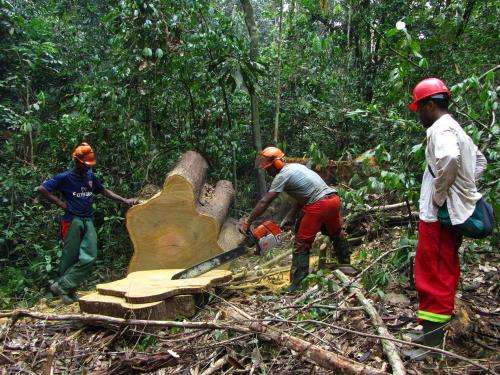Cameroon (Korup National Park) Terminalia ivorensis. Credit: Peter Groenendijk
(Phys.org)—A team of researchers with members from institutions in the Netherlands, Bolivia and the U.K. has found that tree ring samples taken from tropical forests show no evidence of faster growth over the past 150 years—a sign that such trees may not be the carbon sink planet scientists have been hoping for. The team has published their findings in the journal Nature Geoscience. Lucas Cernusak, of James Cook University in Australia, offers a News & Views perspective piece in the same journal issue, on the work done by the team.
For many years, planet scientists have believed that trees in the tropics would grow more if there was more carbon dioxide in the atmosphere, which would result in them taking in more of the gas—and that would, they hoped, offset some of the increase in atmospheric carbon dioxide caused by us humans, thereby staving off, at a least a little bit, global warming. But now the researchers with this new effort report that that may not be the case.
The team gathered and analyzed 1100 tree ring samples taken from tropical forests in Bolivia, Cameroon, and Thailand, looking for signs of growth over the past century and a half (during which time carbon dioxide concentration in the atmosphere has increased 30 to 35 percent). They found that the trees had become better at photosynthesizing, which they had expected. But surprisingly, in looking at the rings, they were not able to find any sign that the trees exhibited higher growth rates, which suggests, that such trees may not be the carbon sink that many had believed them to be. And if that is the case, than planet scientists will have to go back and revise estimates they've been making regarding carbon dioxide levels in the atmosphere in the future, and how that might impact global warming.
The researchers can't explain why the trees don't grow faster—plants in greenhouses with high levels of carbon dioxide do grow faster, and they require less water. Cernusak suggests that work will have to be done to find out the reason, but the suspicion is that it's likely due to interactions and competition for other resources in the rich tropical forest ecosystem, or because the trees are using the extra carbon to produce more fruits or flowers.
More information: No growth stimulation of tropical trees by 150 years of CO2 fertilization but water-use efficiency increased, Nature Geoscience (2014) DOI: 10.1038/ngeo2313
Abstract
The biomass of undisturbed tropical forests has likely increased in the past few decades1, 2, probably as a result of accelerated tree growth. Higher CO2 levels are expected to raise plant photosynthetic rates3 and enhance water-use efficiency4, that is, the ratio of carbon assimilation through photosynthesis to water loss through transpiration. However, there is no evidence that these physiological responses do indeed stimulate tree growth in tropical forests. Here we present measurements of stable carbon isotopes and growth rings in the wood of 1,100 trees from Bolivia, Cameroon and Thailand. Measurements of carbon isotope fractions in the wood indicate that intrinsic water-use efficiency in both understorey and canopy trees increased by 30–35% over the past 150 years as atmospheric CO2 concentrations increased. However, we found no evidence for the suggested concurrent acceleration of individual tree growth when analysing the width of growth rings. We conclude that the widespread assumption of a CO2-induced stimulation of tropical tree growth may not be valid.
Journal information: Nature Geoscience
© 2014 Phys.org























